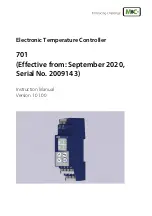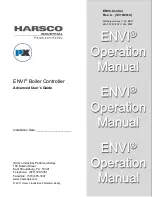
©
National Instruments Corporation
16-1
16
Rotating Knife
The purpose of this application is to cut a web with a rotating knife.
The blade must cut precisely between labels on the web. Because the web
material can stretch under certain conditions, it is not enough to cut the web
at constant length, because the length of each label can vary. To accomplish
this task, the web is marked one time per cycle at the required cutting
location. The motion controller reads this mark using a sensor and performs
the necessary correction.
To simplify this example, assume that the length of the cut is equal to the
circumference of the knife. Under ideal conditions, the mark should be read
when the blade is at position A, as shown in Figure 16-1. Therefore, the
motor should move one revolution without any correction before causing
the cut.
Tip
Refer to Chapter 10,
Electronic Gearing and Camming
, for information about
superimposed moves/registration applications.
Solution
The rotary knife is electronically geared to the web with a gear ratio of 1:1,
which ensures that at the time of cut, the speed of the web and the knife is
the same. The speed of each must be the same to make a clean cut without
stretching the web. Also, under ideal conditions, the web and rotating knife
move the exact same distance. For example, the length of the cut might be
one revolution, which is equal to 2,000 counts.
The sensor reading the mark is connected to one of the high-speed capture
lines on the motion controller. Because the elasticity of the web material
results in varying label lengths, the mark can be read before the blade is at
position A or after it is at position A. The application must correct the
position where the blade of the rotary knife should be when the high-speed
capture occurs. This correction must occur after the blade has crossed
position A so that the current cut is not damaged. To accomplish this goal,
mark the correction point to be at position B, as shown in Figure 16-1.
















































